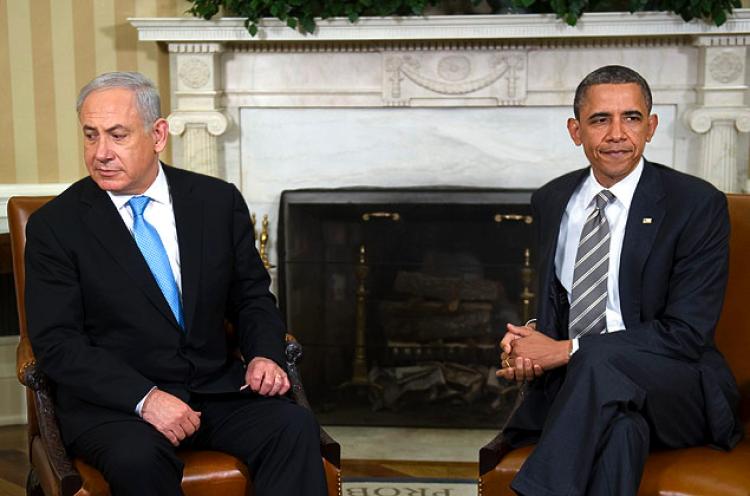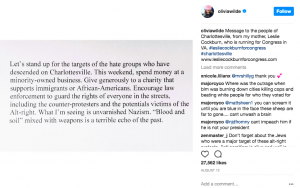By Emily Maloney
After the recent events in Charlottesville, Virginia, in which white supremacists waved flags with swastikas on them and chanted “Jews will not replace us,” it is undeniable that antisemitism is alive and well in the United States. While it is – or should be – easy to denounce these neo-Nazis proudly brandishing swastikas on the alt-right of American politics, a twin snake of antisemitism exists on the American left, which far too often goes unacknowledged and unquestioned. If the progressive left in the United States does not examine the growing antisemitism within their ranks, they risk pushing out a marginalized group that shares many progressive viewpoints, at a point in time when Jews need political safety more than ever.
Even during the Charlottesville rally, with the overt antisemitic actions of the Nazi crowd who went as far as to threaten the local synagogue, Congregation Beth Israel, there was a beguiling erasure of Jews as a targeted group by members of the left on social media. Lily Herman noted specifically that both Olivia Wilde and Bernie Sanders talked about Neo-Nazis and racism, but did not mention Jews in their social media posts. Condemning the actions of the white supremacists all under the umbrella of racism without mention of Jews disregards the fact that Jews are currently – and have been historically – discriminated against and threatened by people who believe they are an “inferior race.”
Clearly, antisemitism is not unique to the Holocaust; antisemitism has existed in the United States for centuries. When the U.S. decided to enter World War II, it was not to save Jews or to fight for those being killed by the Nazis in Germany, but because Pearl Harbor was attacked by the Japanese. Jews seeking refuge, including Anne Frank, were turned away at the U.S. border or denied entry visas. Many of them went on to perish in the Holocaust. In Georgia, Jewish engineer Leo Frank was brutally lynched in 1915 for a crime he likely did not commit. The Atlantic reports that in the 19th and 20th centuries, “…boundaries [between Jews and others] were further enforced by widespread anti-Semitism: Jews were often excluded from taking certain jobs, joining certain clubs, or moving into certain neighborhoods.”
Nowadays, antisemitism still exists in this format on the alt-right, as can be seen from the Charlottesville incident and from the bomb threats sent to synagogues and Jewish centers throughout the U.S. since President Donald Trump’s election. With the rise of this indisputably threatening antisemitism, one would expect that the left – with its reputation as the group that styles itself as a group that fights for the rights of those who are discriminated against – would be making room for Jews within their political sphere. However, on the left, “Jews are seen as part of a white-majority establishment that seeks to dominate people of color.” This pervasive view means that progressive Jews face antisemitism even in their political spaces, mostly due to the view of Israel as an apartheid state. But forcing Jews who believe in Israel’s right to exist to account for every action of the Israeli government is unfair – and not a standard applied to other nations in the world. Unquestioned anti-Israel sentiment on the left has led to blatantly antisemitic actions in the past few months.
During the Chicago Dyke March, Jewish women carrying rainbow flags displaying the Star of David were asked to leave the march for being “Zionist,” ignoring that the Star of David, or Magen David, is simply a symbol of Judaism – not Israel – and one that has existed for thousands of years. Furthermore, the symbol is significant for many Jews because Adolf Hitler made Jews wear yellow Stars of David during the Holocaust to indicate their Jewish status. When confronted with their antisemitism, the founders of the march did not apologize, and instead opted to use an antisemitic slur, “Zio,” which was “popularized by former KKK Grand Wizard David Duke.” This explicit antisemitism in the vein of anti-Zionism on the left is corrosive, and needs to be addressed if the left wants to continue to uphold its ideals of standing up for the marginalized.
Even in the world of popular culture, which nowadays leans more liberal and inclusive of oppressed groups, artists have recently been expressing antisemitic tendencies. In his new album 4:44, Jay-Z employs an antisemitic myth in the song “The Story of O.J.” He raps,
“You wanna know what’s more important than throwin’ away money at a strip club? Credit/
You ever wonder why Jewish people own all the property in America? This how they did it.”
The Anti-Defamation League, an organization that fights antisemitism, spoke out against these lyrics, proclaiming that they “play into deep-seated anti-Semitic stereotypes about Jews and money. The idea that Jews ‘own all the property’ in this country and have used credit to financially get ahead are odious and false. Yet, such notions have lingered in society for decades, and we are concerned that this lyric could feed into preconceived notions about Jews and alleged Jewish ‘control’ of the banks and finance” in an interview with Rolling Stone.
Unfortunately, Jay-Z appears to believe a time-old stereotype about Jews, one which was used by Nazis to garner the support of poor whites against Jews. In reality, the reason that Jews are so well-represented in the financial sphere harkens back to the medieval times, when the church restricted the occupations the Jews could take, leaving banking as one of their few options. While Jay-Z – and others – probably view these lyrics as a compliment, they perpetuate the idea that all Jews are wealthy, which plays into the progressive view of Jews as “oppressors.” In reality, “20% of U.S. Jews report household incomes of less than $30,000 per year,” according to a PEW research survey.
All of this goes to say that at this moment, Jews are in a precarious position in the United States. They face overt antisemitism from alt-right white supremacists, who threaten bodily harm to Jews and Jewish places of worship. And they do not find refuge in the American left, where monolithic views on Israel and the “whiteness” of Jews exclude them from the marginalized narrative.
N.B. The spelling of antisemitic was used in this article instead of anti-Semitic as per the guidelines released from the International Holocaust Remembrance Alliance.


